Tidal Shift Against Brexit
A new study finds that a majority of the UK population---and of UK Parliamentary seats---support remaining in EU.
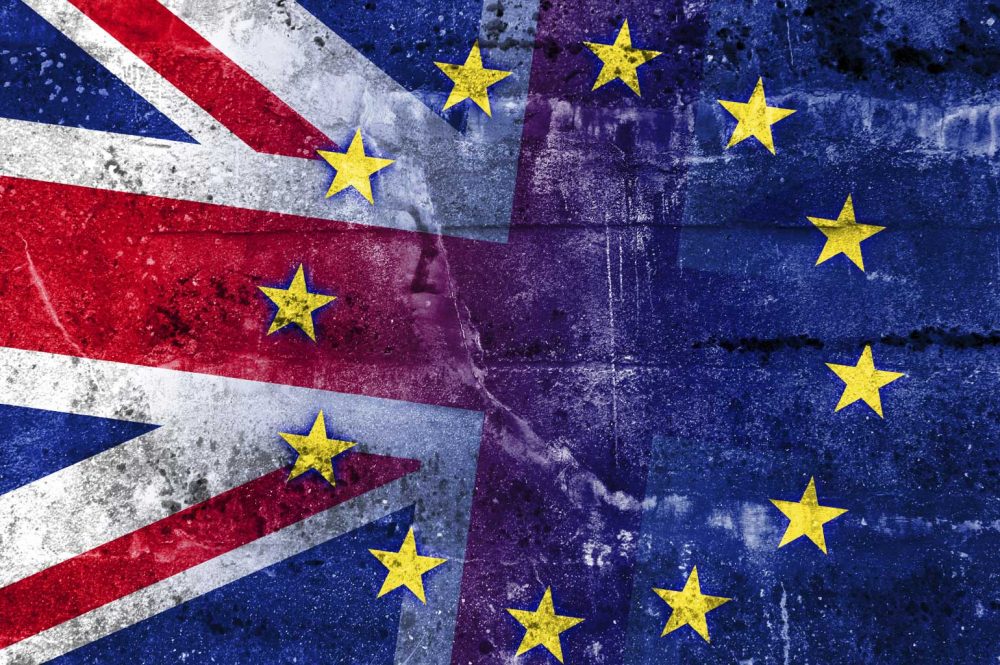
The Guardian (“More than 100 seats that backed Brexit now want to remain in EU“):
More than 100 Westminster constituencies that voted to leave the EU have now switched their support to Remain, according to a stark new analysis seen by the Observer. [The two papers co-publish on Sundays-jhj]
In findings that could have a significant impact on the parliamentary battle of Brexit later this year, the study concludes that most seats in Britain now contain a majority of voters who want to stay in the EU.
The analysis, one of the most comprehensive assessments of Brexit sentiment since the referendum, suggests the shift has been driven by doubts among Labour voters who backed Leave.
As a result, the trend is starkest in the north of England and Wales – Labour heartlands in which Brexit sentiment appears to be changing. The development will heap further pressure on Jeremy Corbyn to soften the party’s opposition to reconsidering Britain’s EU departure.
Researchers at the Focaldata consumer analytics company compiled the breakdown by modelling two YouGov polls of more than 15,000 people in total, conducted before and after Theresa May published her proposed Brexit deal on 6 July.
It combined the polling with detailed census information and data from the Office for National Statistics. The study was jointly commissioned by Best for Britain, which is campaigning against Brexit, and the anti-racist Hope Not Hate group.
The 632 seats in England, Scotland and Wales were examined for the study. It found that 112 had switched from Leave to Remain. The new analysis suggests there are now 341 seats with majority Remain support, up from 229 seats at the referendum.
One seat has switched support in Scotland and 97 have switched in England, while 14 of the 40 seats in Wales have changed from Leave to Remain. Overall, the model puts Remain on 53% support, with 47% backing Leave.
It suggests that there is now a majority for Remain in Scotland and Wales – meaning greater pressure on the union following the UK’s departure. Young voters and those from ethnic minorities have also driven the switch to Remain.
What this means practically is unclear. Theresa May gambled and lost in last summer’s snap election but she nonetheless kept the premiership in a coalition government. Absent significant shifts within the coalition itself, there won’t be an intervening election before she can fully implement Brexit.
Were she so inclined, however, May could certainly read the tea leaves and call for a second referendum. She could cite not only changing polls but also significant new evidence of Russian interference in the first ballot. Again, though, there’s no indication that she’s so inclined.
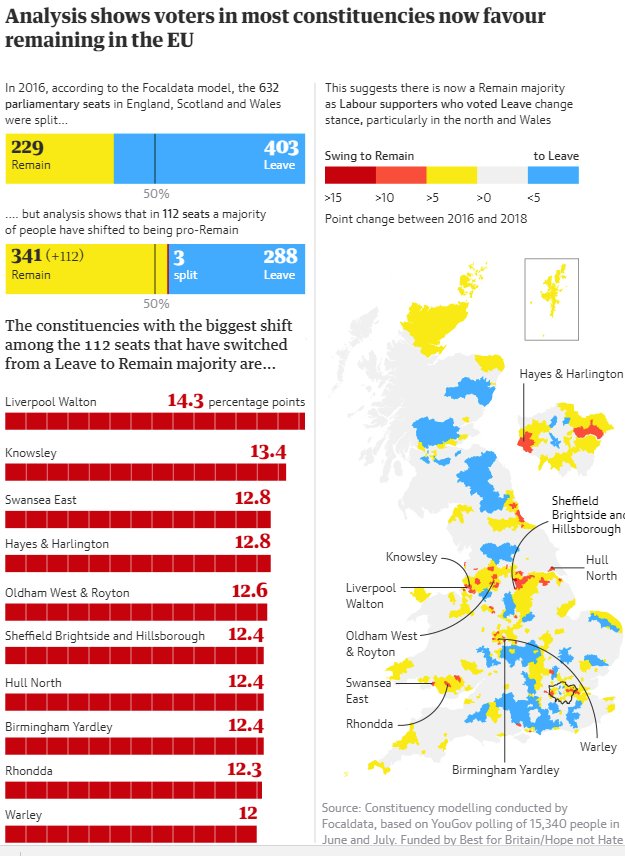


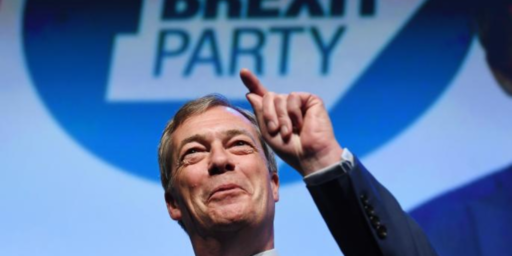
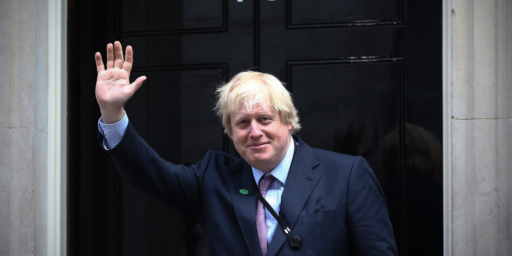
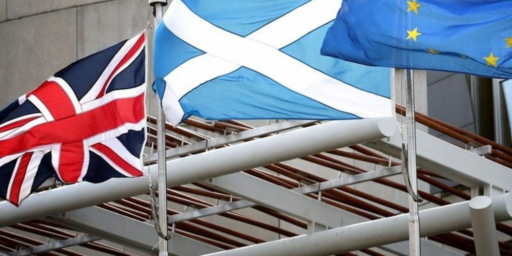
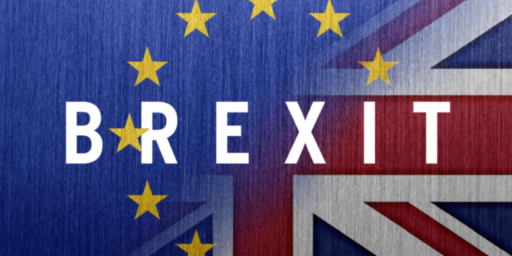
Democracy is for little people.
And thanks to my BING facepage I see that Boris Johnson has said that revoking Brexit would be ‘better’ for him than a ‘soft’ Brexit.
The connection often made between the Brexit vote and the Trump election must be providing a huge banquet of food-for-thought among folks in that R-party.
And I wait for GrumpyRealist’s contribution like the cat that ate the cheese and sat by the mousehole with baited breath!
@OzarkHillbilly:Democracy has never been about following the opinion polls. I think Brexit is an awful idea but 1) it won at the polls and 2) May retained power pursuant to the snap election. So, we have both direct democracy and representative democracy validating the choice.
I’ve written about second thoughts about Brexit, Bregrets you might call them, in the past most notably here and here.
One of the stumbling blocks here could be the fact that the E.U. has said in the past that, as far as it is concerned, once the United Kingdom pulled the trigger on formally leaving the European Union the process was irrevocably put on that path and that there is no turning back. This could, of course, be seen as a negotiating point more than an actual position, but we’re getting close to the point of no return here. Unless May calls for a second referendum or takes another action to step back from the brink, the UK will be leaving the EU next year. The problem she faces is that if she does this she is probably guaranteeing either another election or a challenge to her leadership of the Conservative Party (something that has former Foreign Minister Boris Johnson licking his chops) that would likely lead to her downfall.
Historically, blunders and other terrible mistakes happen in such a way that it’s hard to reverse or fix them, mostly because they’re revealed as mistakes only after they happen, or after they’ve been set in motion. Things like WWI, the Iraq War, the Molotov-Ribbentrop pact, the Watergate cover up, and even May’s snap election last year.
Brexit’s been revealed as a blunder, but there is time and the means available to reverse it before its worst effects take place.
Whatever the bad consequences of Britain leaving the EU are, they’ll be compounded by the fact that there were lifelines available, but the politicians were too obtuse to take them.
@James Joyner: Hence her fear of holding another vote. I get the fact their are reasons for not holding another vote, I also get the fact that there are more than a few for holding another vote, not the least of which is that Brexit was sold to the UK voters under false pretenses.
As to validating choices, elections are never blanket endorsements/rejections of a party’s agenda. These things are messy.
@OzarkHillbilly: Yup, it’s Arrow’s impossibility theorem at work.
@Doug Mataconis: @Kathy: But this was easily seen as a blunder from the outset. May’s predecessor was a Remain advocate but punted to the voters, not foreseeing that the minority of Leavers was going to be much more easily mobilized than the majority of Remainers. There have been many offramps but May has inexplicably been determined to drive the car off the cliff.
@James Joyner:
Part of the reason for May’s behavior appears to be the fact that the “Leave” faction inside the Conservative Party has become stronger. Whether the new evidence you cite in the post above changes that calculus is unclear.
And, as I said, it is unclear how the E.U. would respond to this. Ultimately, I think they’d be fine with welcoming the U.K. back, although they may want to extract a price of some kind.
@James Joyner:
It may behoove the representative part (which was not a strong endorsement, as you note) to revisit the direct part if disaster for the country is to be averted.
Brexit, like a lot of what we see in the US at the moment (e.g., trade wars are easy to win), sounds like a good idea to people who don’t like to be told what to do, but don’t understand the complexity of what they think they want. Just the Irish situation alone created a huge reason to stay in the EU.
Cameron was an idiot for putting to a vote in the first place.
@James Joyner: We are getting a prime example of that here in Misery this election year. Right to Work went down in flames in the primary by an almost 2-1 margin and yet I gawddamguarantee the same Republicans who made it an issue by passing the legislation to begin with will be returned to Jeff City by the electorate in Nov. because of Guns and Jesus.
@Doug Mataconis: The EU has not said any such thing:
There have been opinions expressed by various actors that this is the case, but there has been absolutely no binding or even EU as EU formal position here.
You can read this blog post linking to an actual (recent) EU Parliamentary paper on the subject: http://eulawanalysis.blogspot.com/2018/01/can-article-50-notice-of-withdrawal.html
The actual state of things is that while many opinions of various EU level actors and national level actors have been published as warnings pre Notification, there is not a formal legal guidance nor even a formal, binding, all-EU position on the matter.
@Doug Mataconis:
No.
In fact is quite clear that the EU institutionally would breathe a huge sigh of relief.
Even the anti-UK national level actors would be relieved as the downsides of destabilization override overall gains.
It is rather unlikely a revocation would be received with a Pound of Flesh reaction – notably as the legal basis for doing so is essentially non-existent if one allows for the recovation.
Political weakening of UK within the EU has already occured.
@Steven L. Taylor:
Well yes, he was even more an idiot for putting forward a poorly designed referendum that did not account for the component interest of the United Kingdom and most particularly dealing with the very well known Scottish and Northern Ireland components and the rather damaging divergence of interest of those territories relative England (and resentment of a certain kind of English myopia in UK decisioning).
Regretably the Little Englander component of the Conservative Party won the day and Cameron being blunderer, blundered into this without good reason. The mere putting in place of some validity triggers like a majority of all components of the United Kingdom would have been an easy firewall – particularly given the near simultaneous issues around the Scottish vote.
@Steven L. Taylor:
Don’t ever call a referendum if you don’t know beforehand what the result will be.
I wonder, if there is a second referendum, what the leavers will put forth as arguments, seeing how much has been discredited already.
@James Joyner:
With Brexit, it’s more complicated than that. You can argue that failing to follow through on Brexit violates a commitment to voters. But you can also argue that following through violates an equally important and specific commitments to two major groups of voters. First, shortly before the Brexit vote there was a referendum on Scottish independence. The UK government explicitly argued against it by warning that leaving the UK would jeopardize Scottish participation in the EU. Polls showed this had a major impact on the Scottish voters. Prior to this, the peace agreement that brought an end to the Northern Ireland Troubles guaranteed there would be no border between Norther Ireland and the Republic of Ireland. That border will be reinstated and the proponents of unified Ireland in the North will have very legitimate reasons to say the British unilaterally revoked the treaty.
The voters were lied to in a huge way on the most fundamental repercussions of Brexit. Essentially they voted on getting a shiny new house and once the deed was signed were told that what they bought was actually getting a collapsing death trap full of mold and rats. Moving forward with what Brexit really is because voters endorsed a completely different fantasy is asinine.
A question, appropriate to both the Brexit and Trump votes is whether an electorate that has been systematically lied to can be considered to have made a real democratic decision. I understand politicians lie – they lie because we want them to lie, we want them to feed our prejudices and presuppositions. But at some point surely a line has been crossed. The British people were fed absolute lies and Russian disinformation, as were the American people.
The argument can certainly be made – and I’ve made it – that the final responsibility is with the people. There is no defense against catastrophic voter failure. But let’s be honest and admit that Brexit and Trump both happened because voters were lied to, over and over again. The politicians were complicit in deceiving voters into making the most damaging votes in modern history.
This is a very big problem. Very big. Democracy cannot survive widespread voter imbecility.
@JohnMcC: I doubt the U.K. is going to backtrack. The ultra-Brexiters have the bit between their teeth and are galloping as hard as possible towards the cliff edge. Any comments by anyone about how a “no deal” will be a financial fiasco is shot down by the ultra-Brexiters as “Project Fear” and loud complaints about how Brexit-in-name-only is Not What People Voted For and how it’s all Against Democracy if they go for a second referendum. My feeling is they want to keep the whole stampede going until after March 31, 2019, then will immediately turn around and blame the EU for any resultant problems. It’s always The EU’s fault whenever something goes bad in Britain, at this point.
Too many politicians have planted their flags on the Brexit side of the equation and are unwilling to admit they made a bloody big mistake. And then, of course, you’ve got people like Farage and Boris Johnson who are perfectly willing to continue egging on the whole disaster, just as long as they’re able to gain more power. They know that a large percentage of their followers are Daily Mail and Daily Telegraph readers and are perfectly happy to continue reading stories about How It’s All The EU’s Fault and The EU Treated The U.K. Horribly. Nothing, but nothing, is ever the U.K. government’s responsibility. If they aren’t blaming the EU, they’re blaming “socialists”, or “higher education”, or “those foreigners.”
Much like Trump’s deplorables, in fact. It’s not surprising that Farage and Bannon are BBF.
Basically, it’s the beginning of WWI all over again. And we know how what that all slid into…..
P.S. Anyone who wants to keep an eye on the mess that the Brits should be planning for needs to keep reading EUreferendum.
P.P.S. At this point I suspect that the EU is so sick and tired of dealing with the U.K. and the chaos that is being generated that they’re looking forwards to getting rid of them. Something the U.K. doesn’t realize–the more preparation the EU does for an “accidental fall-out Brexit”, the less they’re going to be willing to change stance in their negotiations, especially since the Brits are showing themselves less and less able to stick to any one position. It’s still not an EU-UK negotiation–the U.K. hasn’t figured out what it wants yet (aside from total pie-in-the-sky utopia) and what is going on right now is a dogfight among the many branches of Brexit supporters. All the while the clock is ticking.
It’s worth noting that this was a mom-binding referendum.
To quote a popular tweet: this is like taking a sledgehammer to your house because of a twitter poll.
@James Joyner:
If memory serves correctly, Brexit barely won. Ok, looking it up — 53 to 46, more than barely, but hardly a solid victory.
Should matters like this be decided by a narrow margin, on a single vote? Given the potential costs, I would want either a supermajority initially, or a confirmation vote once there is a plan for Brexit.
Government is supposed to be pursuing what it best for the people — all the people, not just their own supporters — and that may mean checking back with them before making controversial and irreversible decisions, rather than simply declaring a mandate and pursuing it while ignoring public opinion.
There are certain reasons some people have second thoughts about leaving. It might be fear or worry about Britain’s decline and continued weakening.
The EU is basically a one world type of government that seeks to control the countries and people of Europe through a bunch of regulations and controls.
@James Joyner: “I think Brexit is an awful idea but 1) it won at the polls…”
In a rigged and non-binding referendum.
In addition, if UKIP/Tories had lost that referendum, they would not have given up. Remainders don’t owe them anything.